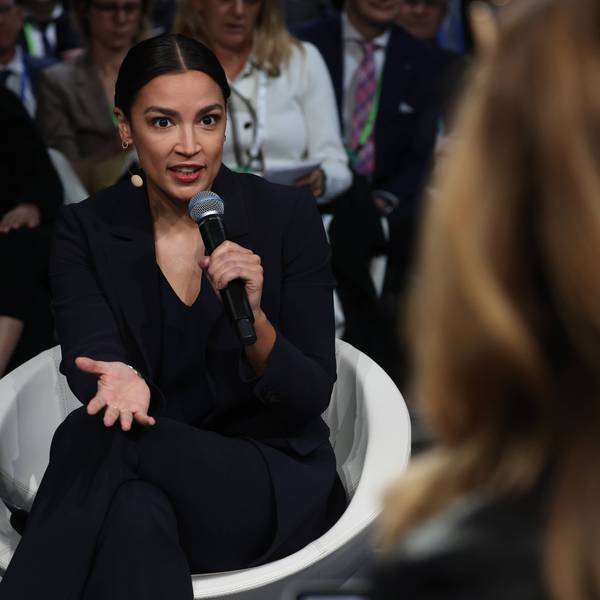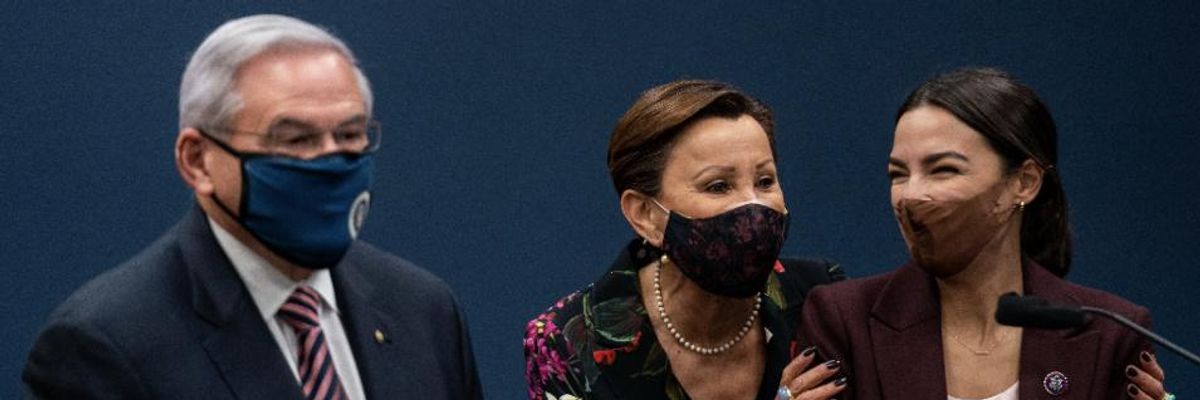Amid renewed debates over Puerto Rican statehood given Democratic control of both Congress and the White House, a trio of lawmakers on Thursday reintroduced a bill that would allow residents of the U.S. island territory to chart their own political path.
Reps. Nydia Velazquez (D-N.Y.) and Alexandria Ocasio-Cortez (D-N.Y.) joined with Sen. Bob Menendez (D-N.J.) to introduce the Puerto Rico Self-Determination Act of 2021, which aims to "empower Puerto Ricans with an inclusive and democratic process to determine their own political future and relationship with the United States" through a status convention with elected delegates.
"Over a century ago, the United States invaded Puerto Rico. And ever since the U.S. has pursued its own colonial rule," said Velazquez, who was born in the territory. "While many may disagree about the future of Puerto Rico's status, we must recognize that the decision should come from those who will be impacted most: the people of Puerto Rico."
"That is why we are introducing the Puerto Rico Self-Determination Act," she continued. "After over 100 years of colonial rule, Puerto Ricans would finally have a democratic mechanism to determine their own future."
The reintroduction comes about two weeks after Rep. Darren Soto (D-Fla.), who is of Puerto Rican descent, and Jenniffer Gonzalez Colon--a Republican who serves as the resident commissioner of Puerto Rico in Congress--introduced the Puerto Rico Statehood Admission Act.
Ocasio-Cortez, who is also of Puerto Rican descent, echoed her recent remarks about the statehood bill versus the legislation she is co-leading.
"The principled position--especially for the head of that colonizing power--is to say that people should have a process of self-determination and to not put your thumb on the scale of one direction or another," she said Thursday. "Our bill outlines a just, democratic, and inclusive process for Puerto Ricans to decide their future."
Menendez similarly argued that "the more than three million residents of Puerto Rico deserve a comprehensive and fair process to chart their own path forward."
"This is the most inclusive approach to addressing the long-overdue question of Puerto Rico's political status," he said, "but most importantly, it offers the people of Puerto Rico a legitimate and democratic process to determine their own future."
Velazquez and Ocasio-Cortez first unveiled the legislation last summer. At the time, they co-wrote an opinion piece for NBC News, detailing how "Puerto Rico has been subjected to policies foisted on it by a Congress frequently uninterested in the welfare of those who live there."
As the congresswomen explained:
This reality touches every aspect of Puerto Rican life: Puerto Rico receives disparate treatment for Medicaid reimbursement, nutritional support, and a host of other safety net programs, despite being poorer than the poorest state. These problems and others stem from Puerto Rico's unique, long-standing colonial status, which has resulted in the island's residents being treated as second-class citizens.
The time to remedy this situation has come, but it must be done correctly. Puerto Rico needs to be afforded the freedom to design its own future. That's why the two of us, both members of Congress of Puerto Rican descent, have introduced the Puerto Rico Self-Determination Act. The legislation that would prompt Puerto Rico's Legislature to create a status convention whose delegates would be elected by Puerto Rican voters. This body would develop a long-term solution for Puerto Rico's status, be that statehood, independence, free association, or any option other than the current territorial arrangement.
What the convention negotiates and puts forth would then be voted on in a referendum by the people of Puerto Rico before presentation to the U.S. Congress. The key is that this framework would be developed by Puerto Ricans and for Puerto Ricans, not dictated to them like so many previous policies.
By contrast, the statehood measure--which is backed by Puerto Rican Gov. Pedro Pierluisi, a member of the New Progressive Party who caucused with the House Democrats when he served as resident commissioner--would leave Puerto Rico's future in the hands of a Congress that doesn't even allow the territory's delegate in Washington, D.C. to vote on legislation.
Statehood would provide benefits to Puerto Ricans--including the ability to vote in federal elections and equal representation in Congress--and in the latest nonbinding referendum, a narrow majority of Puerto Ricans voted in favor of the territory becoming a state. However, some critics of the statehood push have suggested it doesn't give residents of the territory enough say in their political system.
"This plebiscite that was conducted by the New Progressive Party was a political trick to entice people to come out to the polls," Velazquez told Axios earlier this month.
"It's highly suspect when anyone is trying to prescribe an outcome for millions of people," Ocasio-Cortez told Axios. "We have to think about how ridiculous this is that the entire future and status of a colony of the United States should just be determined by a simple ballot referendum."
Shortly after the statehood bill's introduction, advocates from more than 80 organizations across 16 states and the U.S. territory sent a letter urging House Speaker Nancy Pelosi (D-Calif.) and Senate Majority Leader Chuck Schumer (D-N.Y.) to prioritize the self-determination measure, arguing that "it is only Puerto Ricans who should have the authority and right to decide the future of Puerto Rico."
Welcoming the bill's reintroduction, Julio Lopez Varona, co-director of community dignity campaigns at the Center for Popular Democracy Network, noted that "for over 120 years, Puerto Rico has been a colony of the United States. It has extracted wealth from Puerto Rico, persecuted political dissidents, used its land for military testing, and treated its people as human guinea pigs for Big Pharma experiments."
"More recently, its failed economic policies have left the island suffering through a debt crisis, exacerbating the harms resulting from natural disasters and the Covid-19 pandemic," Lopez Varona added, nodding to the devastation left by Hurricanes Irma and Maria in 2017.
"This Congress and the Biden-Harris administration now have a historic opportunity to take a serious look at the impact colonialism has had on Puerto Rico and finally change course," he said. "The Self-Determination Act provides a clear path to decolonization through self-determination that could put an end to Puerto Rico's colonial status and ensure that its people have a voice in their future. Now is the time for Congress to pass this legislation and take an important step in addressing the human rights abuses that have been inflicted on the island."
On the campaign trail, President Joe Biden acknowledged that "moving forward to a future of renewal and respect is not fully possible without addressing the issue of Puerto Rico's political status, which has been debated for decades," and vowed that if elected, he would "work with representatives who support each of the status options in Puerto Rico to engage in a fair and binding process to determine their own status."




